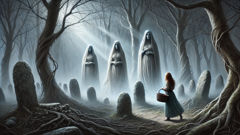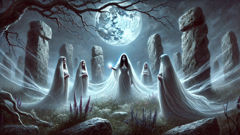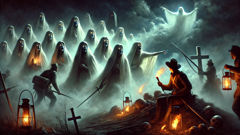Introduction
In the heart of Gelderland, where the land billows with ancient forests and the ground sighs beneath dense carpets of moss, the morning fog weaves stories older than any human tongue. Here, villagers rise before dawn, their senses sharpened by generations of whispered warnings: Beware the mists, for within them move the Witte Wieven—the White Women. To some, these pale apparitions are omens of misfortune; to others, they are protectors, bearing the wisdom of ages and the secrets of healing. Their legend is as much a part of the land as the oaks and the heather, rippling through time and memory, leaving both fear and hope in its wake. The Witte Wieven are said to dwell in the hollows and barrows scattered across the countryside, their laughter echoing like bells in the stillness, their presence revealed only when the world softens into twilight or the fog hangs thick and low. Stories abound of travelers who vanished after glimpsing white-clad figures swirling above burial mounds, or of desperate souls who found guidance when they surrendered their pride at the crossroads. In the medieval village of Elten, on the edge of these haunted woods, a young woman named Marit lives in the shadow of this legend. Her days are spent tending her mother’s herb garden and binding wounds for neighbors, but her nights are filled with dreams she can’t quite explain—dreams where voices call her into the mist, promising revelation or ruin. The boundary between this world and the realm of spirits is never more fragile than in Gelderland’s mists, and as Marit’s story unfolds, so too does the living heart of the Witte Wieven legend, rich with beauty, peril, and the search for truth.
I. The Mists Gather in Elten
The village of Elten clung to the forest’s edge, its crooked thatch-roofed cottages huddled together for warmth and reassurance. At dawn, tendrils of mist curled through muddy lanes and drifted over barley fields, muffling the world in a pale hush. Marit rose with the first light, her feet cold on the packed earth floor, and began her daily ritual—fetching water from the well, collecting eggs, crushing dried nettles for salve. Her mother, Fenna, watched from a three-legged stool, her clever hands never idle, her eyes knowing. Elten depended on Fenna’s knowledge: she could set a bone, calm a fever, or coax birth from a reluctant womb. But with that respect came wariness, for everyone in Elten knew the legend of the Witte Wieven and wondered how much truth lived behind Fenna’s knowing smile.

Most villagers avoided the forest at night, especially near the ancient burial mounds marked by weathered stones and silent yew trees. These were the places where mist gathered thickest, swirling in ghostly whorls that seemed to move with intent. Grandmothers whispered that the White Women rose from these mounds to dance in moonlight, weaving fate and fortune with their long-fingered hands. Some said the Witte Wieven were the spirits of wise women wronged in life; others believed they were guardians, protectors of sacred knowledge. All agreed their favor could be a blessing, and their wrath a curse.
On market days, traders brought news from Arnhem and Zutphen—stories of cattle gone missing, children found sleepwalking in the dew, and a shepherd’s son who vanished after chasing a white shape into the fog. Marit’s heart fluttered with both fear and curiosity each time she heard the tales. She had never seen the Witte Wieven herself, but sometimes, while gathering herbs near dusk, she’d feel watched. Once, a pale figure shimmered at the edge of her vision; when she blinked, it was gone, but the chill remained. Her mother warned her: “Never follow a white shadow, child. And never ask the mists for what you do not truly seek.”
Marit’s fascination grew when she found an old silver comb caught in the roots of a birch tree near the largest barrow. Its teeth were finely wrought and cold to the touch, etched with runes she couldn’t read. That night, dreams came—strange and vivid. She saw herself standing at the edge of the forest, mist swirling around her ankles, voices whispering in a tongue older than Dutch. The comb seemed to hum beneath her pillow. In her dream, a veiled woman beckoned, eyes shining silver above her shroud: “Return what is lost, and you shall find what you seek.”
Restless now, Marit began to question the world she’d always accepted. Was there truth in the legends? Did the mists truly hide wisdom—or only danger? When Elten’s baker fell ill with a mysterious fever that wouldn’t break, the village grew anxious. Some muttered that the Witte Wieven had been offended; others begged Fenna for a cure. Fenna sent Marit to the forest to find feverfew and yarrow, her voice grave: “And if you meet the White Women, be polite. Listen more than you speak.”
The sun was a pale disc behind drifting clouds as Marit entered the woods. Every branch dripped with moisture; each step was muffled by moss. She found the herbs easily enough, but as she turned to leave, the mist thickened, swallowing the path. Heart racing, Marit tried to remember her mother’s warnings. A bell-like laughter floated from somewhere ahead, neither welcoming nor cruel. The world seemed to tilt. Out of the haze, three figures materialized, their forms shifting between solid and smoke. They stood between Marit and her village—tall, veiled, draped in robes the color of moonlit snow.
The tallest spoke, her voice like wind in the reeds: “Why do you walk our woods, child?” Marit swallowed her fear. “I seek herbs for a healing. My mother sent me.”
“And what do you offer in return?” asked another, her tone gentle but edged. Marit thought of the silver comb in her pocket. With trembling hands, she held it out. The third woman smiled—a hint of warmth in her ghostly features. “A gift returned is a promise kept.”
The mists parted, revealing the path home. As Marit hurried back, she glanced over her shoulder. The Witte Wieven were gone, but their laughter lingered, like music woven into the fog.
II. The Bargain of Wisdom
The fever in Elten’s bakery lifted overnight. News spread quickly: not only was the baker’s breath no longer shallow, but he seemed… changed. His eyes glimmered with a clarity that startled his wife. He claimed to have seen visions in his delirium—a shining woman who placed a cool hand on his brow and whispered secrets about bread and fire. The villagers flocked to Fenna’s cottage, some with hope, others with unease. They asked after the silver comb Marit had carried, wondering if its return had pleased the spirits. A few pressed harder, fearful of what new bargains might be owed.

Marit tried to make sense of what she’d witnessed. She sought out her mother that evening as the sky turned to indigo and fog pooled beneath the willows. Fenna listened as Marit described her encounter, nodding as if she’d expected it all along. “The Witte Wieven don’t take kindly to greed or pride,” Fenna said quietly. “But those who act with humility might find wisdom in their gifts—or their warnings.”
The days grew shorter as autumn deepened. Cattle wandered off into the mist and sometimes returned with strange marks on their flanks. The village’s midwife found wild yarrow blooming late in the year—an omen interpreted as both blessing and warning. Each night, Marit’s dreams grew stranger. She wandered endless corridors of fog, glimpsing veiled figures who asked riddles or recounted stories from lives long past. Sometimes she woke in tears, unable to recall the words but certain their meaning was important.
One dusk, Marit discovered an old man at the edge of the forest, leaning heavily on a staff. He was not from Elten; his clothes were unfamiliar, but his eyes were sharp. He claimed to be searching for his lost granddaughter, missing since the previous spring. Villagers watched with suspicion, but Marit felt compassion stir within her. She brought him bread and water and listened to his story. That night, the mists rose thicker than ever, swallowing Elten in a velvet shroud. Dogs whined and geese fluttered in their pens. At midnight, Marit awoke to soft singing drifting through her window.
Unable to resist, she slipped outside, guided by the song’s promise. The world was otherworldly—each tree haloed in silver, each shadow deeper than black. In a glade near the barrows, the three Witte Wieven waited. This time they appeared younger, their veils thinner, their eyes ancient and bright.
“You seek what is lost,” one intoned, voice as clear as a bell. “But not all that’s lost should be found.” The second extended a hand toward Marit, palm up. “Will you trade your certainty for understanding? One truth for another?”
Marit’s courage nearly failed her, but she remembered her mother’s words and nodded. “If it brings peace to the lost.”
The third Witte Wief drew Marit close and breathed mist into her ear—a whisper so cold it burned. Suddenly, Marit saw visions: a little girl dancing on a summer hill, laughter echoing as she chased a white butterfly into the woods; the same child, older, wandering deeper, drawn by a luminous figure who promised secrets of the earth. The child was never harmed; instead, she was transformed—her spirit woven into the mists, forever part of the White Women’s sisterhood.
When Marit returned to herself, she wept for the old man’s loss, but also understood its place in the world’s tapestry. She returned to Elten and told him gently that his granddaughter had found her rest among those who watched over the living. He wept, but thanked her, leaving a carved wooden charm at the barrow as an offering.
That winter, Marit’s reputation as a healer grew. People brought their ailments, but more often their questions: Should I marry? Is my child safe? Will the harvest be good? Marit never claimed to know the answers, but sometimes, when the mists rolled in, she felt a quiet certainty that wisdom was not about knowing all things, but about listening deeply—both to the world and to oneself.
III. When the Mists Turn Dark
Not every encounter with the Witte Wieven brought solace. As years passed and Marit’s hair silvered, there came a spring when the mists arrived earlier than usual—dense, cold, refusing to lift even as the sun rose high. The fields stayed damp; barley rotted in the ground. Some villagers grew anxious and impatient, blaming Marit for favoring the spirits or for angering them by sharing their secrets too freely.

One night, a band of strangers arrived—soldiers from a distant lord, sent to secure the borderlands and root out what they called witchcraft. They questioned Fenna about her remedies, scoffed at Marit’s visions, and demanded to see the burial mounds. When denied, they threatened violence. Marit pleaded with them to leave the sacred places alone, but her words fell on deaf ears.
That evening, as the soldiers drank and boasted in the tavern, the mists thickened outside until not even a lantern’s glow could cut through the gloom. Dogs howled; horses grew restless. The soldiers laughed off the villagers’ warnings and made their way toward the barrows, torches in hand. Marit followed at a distance, heart hammering. When the men reached the largest mound and began poking at the earth with iron-tipped staves, a wind rose—cold and sharp as a blade.
The fog boiled around them. Silhouettes moved within the haze: tall women in white, their robes billowing as if stirred by an unseen current. The soldiers jeered at first, but their bravado faltered as the spirits drew closer, veils floating like banners. The air vibrated with strange music—low and keening, neither human nor beast. The bravest soldier swung his torch at a Witte Wief; the flame sputtered out. Another dropped to his knees, hands over his ears.
Marit watched as the White Women closed ranks around the intruders. Their faces blurred, eyes glowing like foxfire. The soldiers’ shouts faded to whimpers as the mists swallowed them whole. By dawn, only one remained—a youth with terrified eyes who stumbled back to Elten, raving about vengeful ghosts. The rest were never seen again.
In the aftermath, fear and gratitude mingled in the village. Some accused Marit and her mother of calling the spirits; others thanked them for averting disaster. Fenna offered no explanations. She simply lit a candle at her window every night—a sign of peace for both the living and the dead.
That summer, the mists lifted early. Wildflowers bloomed where the soldiers had vanished, and the fields yielded their richest harvest in memory. Slowly, suspicion faded, replaced by a deeper respect for the mysteries woven through the land. Marit tended her garden, her dreams still thick with fog and voices—some warning, some guiding—but always reminding her that wisdom walks hand-in-hand with humility and awe.
Conclusion
Long after Marit’s passing, her cottage fell into ruin, its garden gone wild with yarrow and nettle. Travelers claimed to see a white figure tending the herbs at dawn, her movements gentle and purposeful. Children dared each other to walk the edge of the old barrow at dusk, hoping for a glimpse of the Witte Wieven—or perhaps the wise woman who’d learned from them. Some said Elten prospered because its people honored both reason and reverence, refusing to chase away what they could not understand. Others whispered that the boundary between worlds remained thin in those woods: as long as people greeted the mists with respect and curiosity, wisdom would continue to bloom amid shadows and silence. To this day, when fog curls along Gelderland’s hedgerows or settles over an empty field, villagers watch for flickers of white in the gloom. Sometimes the mists bring warnings; sometimes they bring blessings. But always, they remind those who listen that wisdom is not only found in answers, but in the courage to walk between worlds, open to wonder—and willing to return what is lost.













